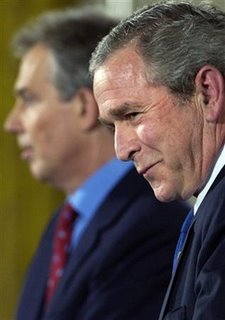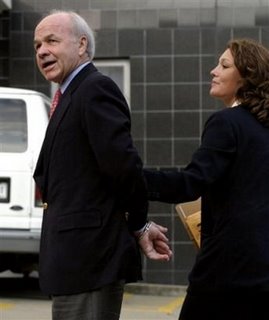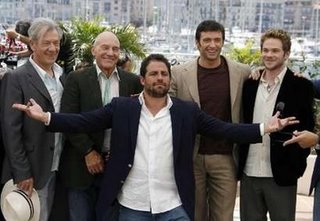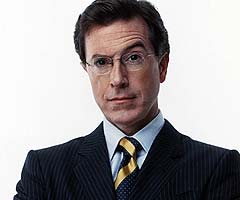Too little, Too late

The Wonder Twins hold a press conference.
In a joint news conference, Bush said he had
used inappropriate "tough talk" -- such as
saying "bring 'em on" in reference to
insurgents -- that he said "sent the wrong
signal to people." He also said the "biggest
mistake" for the United States was the Abu
Ghraib prison scandal, in which guards
photographed themselves sexually tormenting
Iraqi prisoners, spawning revulsion worldwide.
"We've been paying for that for a long period
of time," he said.
Blair, who visited Baghdad this week, said he
and Bush should have recognized that the fall
of president Saddam Hussein would not "be
the rise of a democratic Iraq, that it was going
to be a more difficult process" because "you're
talking about literally building the institutions
of a state from scratch."
While Bush increasingly has begun to
acknowledge missteps in handling the war, his
comments last night -- together with Blair's --
represent his most explicit acknowledgment
that the administration underestimated the
difficulty of the central project of his
presidency.
The hour-long news conference came at a
moment of acute political weakness for both
men, who repeatedly emphasized that Iraq is
finally turning a corner and that, whatever
their other misjudgments, the decision to
attack Iraq remains justified. Blair appeared
dour and exhausted during much of the news
conference, and both leaders became most
animated when talking about their sagging
political fortunes.
"No question that the Iraq war has, you know,
created a sense of consternation here in
America," Bush said. "I mean, when you turn
on your TV screen and see innocent people die
day in and day out, it affects the mentality of
our country." He added: "I can understand why
the American people are troubled by the war in
Iraq. I understand that. But I also believe the
sacrifice is worth it and it's necessary."
Peter Daou:
The significance of this shouldn't go
unnoticed. Bush has now admitted what the
progressive blog community has said all
along: Bush's tough talk was wrongheaded
and cost lives.
Dan Froomkin:
Bush expressed regrets last night for some of
the cowboy rhetoric of his first term, and he
acknowledged that the horrific prison abuse at
Abu Ghraib was a big mistake.
But he wasn't really conceding much. In the
former case, he was expressing regret about
style, not substance; and in the latter case, the
only harm he acknowledged was to America's
reputation -- while taking no responsibility for
any role he might have had in creating the
conditions in which such atrocities could take
place.
Richard Wolffe:
..And for me the big giveaway was at the end
of that answer, I don't know if you can see it
on camera, but the President flashed a big grin
to those of us sitting in the front rows. It didn't
seem that he was quite as contrite as his
performance.










